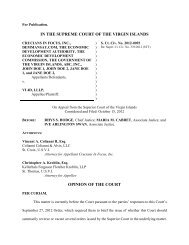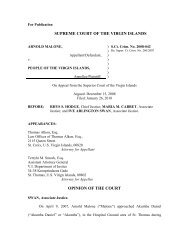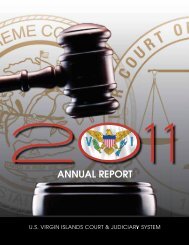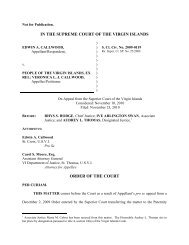IN THE SUPREME COURT OF THE VIRGIN ISLANDS OPINION OF ...
IN THE SUPREME COURT OF THE VIRGIN ISLANDS OPINION OF ...
IN THE SUPREME COURT OF THE VIRGIN ISLANDS OPINION OF ...
Create successful ePaper yourself
Turn your PDF publications into a flip-book with our unique Google optimized e-Paper software.
Terrell v. Coral WorldS. Ct. Civ. No. 2010-0058Opinion of the CourtPage 7 of 15under section 541 7 is limited to the attendance fees provided for by statute.In its Memorandum Opinion, the Superior Court cites Danvers v. Dibra, 6 V.I. 212, 216(D.V.I. 1967), for the proposition that barring prior court approval or a showing that the expertwitness was valuable and that the fee was reasonable, a litigant will not recover expert witnessfees under section 541. The Superior Court denied Terrell an award of costs for her expertwitness expenses for failure to comply with these requirements. (J.A. 37-38.) On appeal, CoralWorld cites Quetel v. Querrard, 278 F.Supp. 341, 342 (D.V.I. 1968) for the same proposition theSuperior Court articulated and upon which it based its decision.Based on the plain meaning of section 541(a)(1), however, there is no indication that theLegislature intended to impose additional or heightened requirements to recover expert witnessfees. See In re Adoption of Sherman, 49 V.I. 452, 468 (V.I. 2008) (“‘In interpreting a statute, thecourt looks first to the statute's plain meaning and, if statutory language is facially unambiguous,its inquiry comes to an end.’” (quoting Lowery v. Ala. Power, Co., 483 F.3d 1184, 1199 (11thCir. 2007))). And, section 541(a)(1) does not provide that the court should or may consider preapprovalor value and reasonableness when determining whether to award costs for expertwitness fees. Therefore, the Superior Court did not have an explicit statutory basis to deny costs7 We note that the Uniform Rules of Evidence that were in effect at the time of the underlying trial and the FederalRules of Evidence that have been recently adopted by the Legislature to replace the Uniform Rules of Evidence,authorize a judge to appoint an expert witness in a civil case, and provide for the taxation of the appointed expertwitness’s compensation as costs. See Chinnery v. People, S. Ct. Crim. No. 2009-0037, slip op. at 17 (V.I. May 27,2011) (explaining that the Legislature repealed the Uniform Rules of Evidence and replaced it with the FederalRules of Evidence on April 7, 2010) (citing Blyden v. People, 53 V.I. 637, 658 (V.I. 2010) and Act No. 7161, § 15);5 V.I.C. § 914 (authorizing appointment of expert by judge); Fed. R. Evid. 706(a) (same); 5 V.I.C. § 915 (providingthat compensation of expert appointed by judge in a civil case will be “charged as costs in the case” unless a morespecific statute establishes a different procedure); Fed. R. Evid. 706(b) (same). Because none of the expertwitnesses in this case were appointed by the Superior Court, this Court’s holding that an award of costs is mandatorywithout prior court approval or showings of value or reasonableness is limited to costs that are awarded pursuant tosection 541; therefore, we do not consider whether any additional showings may be warranted when seeking to havean appointed expert witness’s compensation taxed as costs pursuant to the applicable rules of evidence or otherauthorities.
















